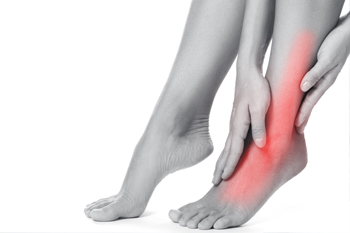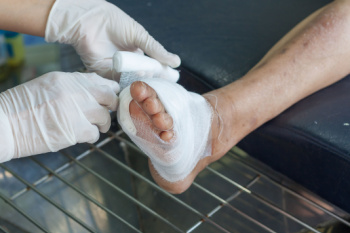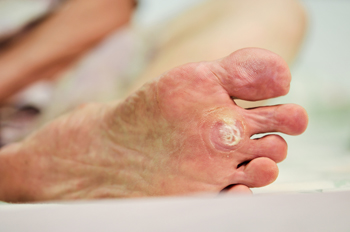283 St Rose Ave
Windsor, ON N8S 1X1
May 2024
Exercises for Toes and Ankles

Maintaining the strength and flexibility of your feet, toes, and ankles can help with overall mobility and comfort, especially if you are experiencing pain or dealing with conditions like arthritis. Start with simple exercises for the feet to help alleviate discomfort and improve function. For example, the Achilles tendon and plantar fascia stretch involves looping a towel around the ball of your foot, pulling your toes toward your body, and holding for 30 seconds. This should be repeated three times on each foot. Rolling your foot over a round object, like a can or ball, and performing seated stretches can also provide relief. Wall pushes, ankle rotations, and ankle range of motion exercises enhance flexibility. Toe spreads, towel pickups, and standing heel raises can build strength. Balancing exercises, such as standing on one leg while lightly touching a wall, can further improve stability. Begin these exercises gradually, and increasing intensity as you build strength and confidence. Always ensure you have sufficient space to exercise safely and it is important to stay hydrated. If you have any concerns or need personalized advice about foot, toe, or ankle pain, it is suggested that you schedule an appointment with a podiatrist before it gets worse.
Exercising your feet regularly with the proper foot wear is a great way to prevent injuries and build strength. If you have any concerns about your feet, contact the practitioners from Foot Care Institute. Our practitioners can provide the care you need to keep you pain-free and on your feet.
Exercise for Your Feet
Exercise for your feet can help you gain strength, mobility and flexibility in your feet. They say that strengthening your feet can be just as rewarding as strengthening another part of the body. Your feet are very important, and we often forget about them in our daily tasks. But it is because of our feet that are we able to get going and do what we need to. For those of us fortunate enough to not have any foot problems, it is an important gesture to take care of them to ensure good health in the long run.
Some foot health exercises can include ankle pumps, tip-toeing, toe rises, lifting off the floor doing reps and sets, and flexing the toes. It is best to speak with Our practitioners to determine an appropriate regimen for your needs. Everyone’s needs and bodies are different, and the activities required to maintain strength in the feet vary from individual to individual.
Once you get into a routine of doing regular exercise, you may notice a difference in your feet and how strong they may become.
If you have any questions please feel free to contact our office located in Windsor, ON . We offer the newest diagnostic and treatment technologies for all your foot and ankle needs.
Complex Regional Pain Syndrome Impacting Feet

Complex regional pain syndrome, or CRPS, also known as reflex sympathetic dystrophy, is a debilitating condition affecting the feet and other body parts. It often emerges following an injury, surgery, or trauma, although its precise origins remain uncertain. CRPS encompasses a range of symptoms, notably persistent and severe pain disproportionate to the initial injury. Sensory disturbances like burning sensations, tingling, or hypersensitivity are common, in addition to vasomotor symptoms such as changes in skin temperature and color, swelling, and alterations in sweating patterns. Additionally, CRPS can lead to motor and trophic symptoms, including muscle weakness, coordination difficulties, and changes in hair and nail growth. Treatment for CRPS typically involves a multidisciplinary approach, incorporating medication and nerve blocks. Podiatrists help in managing foot-related CRPS symptoms, offering specialized care like custom orthotics and tailored pain management techniques to improve mobility and enhance the overall quality of life for individuals grappling with this challenging condition. If you have symptoms of CRPS, it is suggested that you seek help from this type of medical professional.
Some foot conditions may require additional professional care. If you have any concerns, contact the practitioners of Foot Care Institute. Our practitioners can provide the care you need to keep you pain-free and on your feet.
Rare Foot Conditions
The majority of foot conditions are common and can be treated by a podiatrist. Standard diagnostic procedures are generally used to identify specific conditions and treatment can be rendered. A podiatrist also treats rare foot conditions which can be difficult to diagnose and may need extra attention and care.
There are many rare foot conditions that can affect children. Some of these can include:
- Freiberg’s disease
- Kohler’s disease
- Maffucci syndrome
Freiberg’s disease - This can be seen as a deterioration and flattening of a metatarsal bone that exists in the ball of the foot. It typically affects pre-teen and teenage girls, but can affect anyone at any age. Symptoms that can accompany this can be swelling, stiffness, and the patient may limp.
Kohler’s disease - This often targets the bone in the arch of the foot and affects younger boys. It can lead to an interruption of the blood supply which ultimately can lead to bone deterioration. The patient may limp or experience tenderness, swelling, and redness.
Maffucci syndrome - This affects the long bones in a child’s foot leading to the development of abnormal bone lesions. They are benign growths and typically develop in early childhood and the bones may be susceptible to breaking.
A podiatrist can properly diagnose and treat all types of rare foot conditions. If your child is affected by any of these symptoms or conditions, please don’t hesitate to call our office so the correct treatment method can begin.
If you have any questions please feel free to contact our office located in Windsor, ON . We offer the newest diagnostic tools and technology to treat your foot and ankle needs.
Diabetes and Foot Complications

Foot complications are prevalent in individuals with diabetes and can lead to severe consequences if left untreated. Neuropathy, or nerve damage, can result in loss of sensation, making it difficult to detect injuries or wounds. Skin changes, calluses, and foot ulcers are common due to reduced circulation and impaired healing. In severe cases, untreated ulcers can lead to infections, sometimes necessitating amputation. Preventive measures include daily foot inspections, wearing proper footwear, and regular podiatric care. If you have diabetes, it is strongly suggested that you include a podiatrist on your healthcare team. This medical professional can assess your foot health, provide education on foot care, and help manage possible complications.
Diabetic foot care is important in preventing foot ailments such as ulcers. If you are suffering from diabetes or have any other concerns about your feet, contact the practitioners from Foot Care Institute. Our practitioners can provide the care you need to keep you pain-free and on your feet.
Diabetic Foot Care
Diabetes affects millions of people every year. The condition can damage blood vessels in many parts of the body, especially the feet. Because of this, taking care of your feet is essential if you have diabetes, and having a podiatrist help monitor your foot health is highly recommended.
The Importance of Caring for Your Feet
- Routinely inspect your feet for bruises or sores.
- Wear socks that fit your feet comfortably.
- Wear comfortable shoes that provide adequate support.
Patients with diabetes should have their doctor monitor their blood levels, as blood sugar levels play such a huge role in diabetic care. Monitoring these levels on a regular basis is highly advised.
It is always best to inform your healthcare professional of any concerns you may have regarding your feet, especially for diabetic patients. Early treatment and routine foot examinations are keys to maintaining proper health, especially because severe complications can arise if proper treatment is not applied.
If you have any questions please feel free to contact our office located in Windsor, ON . We offer the newest diagnostic and treatment technologies for all your foot and ankle needs.
Causes of Plantar Warts

Plantar warts are noncancerous growths caused by the human papillomavirus, or HPV, infecting the outer layer of skin on the soles of the feet. They often appear as small, grainy lesions with black dots embedded within them, causing discomfort or pain, especially when walking or standing. Those individuals with diabetes or compromised immune systems should be particularly watchful of such growths. These warts are contagious and can spread through direct contact with infected surfaces or skin. Treatment options can include salicylic acid to prescription strength treatments such as cryotherapy, laser therapy, or surgical removal. If you have a plantar wart that causes persistent pain, changes in appearance, or interferes with walking, it is suggested that you seek podiatric attention.
Plantar warts can be very uncomfortable. If you need your feet checked, contact the practitioners from Foot Care Institute. Our practitioners will assist you with all of your foot and ankle needs.
About Plantar Warts
Plantar warts are the result of HPV, or human papillomavirus, getting into open wounds on the feet. They are mostly found on the heels or balls of the feet.
While plantar warts are generally harmless, those experiencing excessive pain or those suffering from diabetes or a compromised immune system require immediate medical care. Plantar warts are easily diagnosed, usually through scraping off a bit of rough skin or by getting a biopsy.
Symptoms
- Lesions on the bottom of your feet, usually rough and grainy
- Hard or thick callused spots
- Wart seeds, which are small clotted blood vessels that look like little black spots
- Pain, discomfort, or tenderness of your feet when walking or standing
Treatment
- Freezing
- Electric tool removal
- Laser Treatment
- Topical Creams (prescription only)
- Over-the-counter medications
To help prevent developing plantar warts, avoid walking barefoot over abrasive surfaces that can cause cuts or wounds for HPV to get into. Avoiding direct contact with other warts, as well as not picking or rubbing existing warts, can help prevent the further spread of plantar warts. However, if you think you have developed plantar warts, speak to your podiatrist. He or she can diagnose the warts on your feet and recommend the appropriate treatment options.
If you have any questions please feel free to contact our office located in Windsor, ON . We offer the newest diagnostic and treatment technologies for all your foot and ankle needs.









